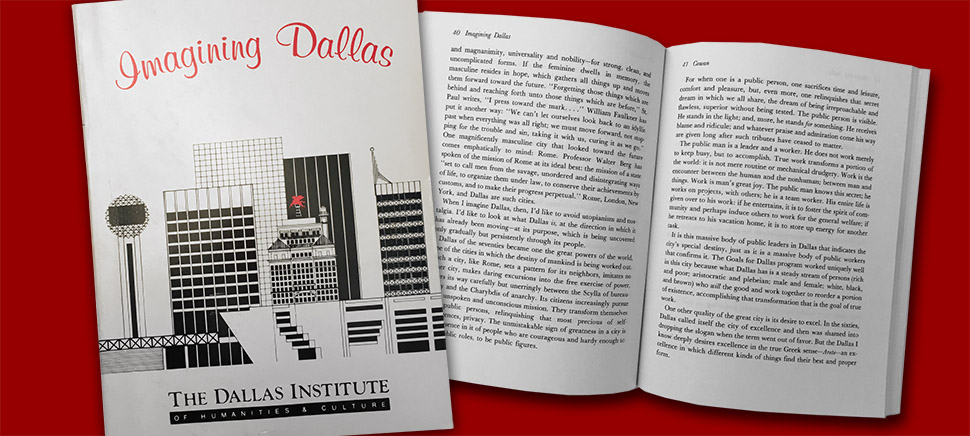Upon returning to Dallas five years ago, I read a book of essays titled “Imagining Dallas,” a city-focused publication from the Dallas Institute of Humanities and Culture (DIHC). Reading it was a way to recalibrate toward “Big D” and its boldness, its hospitality, class structures, business acumen, and the unknown political wilds of its mirrored skyscrapers and flood planes. I did not foresee that a little paragraph about education would become a touchstone for my thoughts about Dallas in the coming years.
Written in 1985, the essays in “Imagining Dallas” evoked images of the city’s formation and evolution, its good ol’ myths as well as possible futures for the ever-aspirational Dallas, Texas. Leaders from a variety of disciplines, including Wick Allison, James Pratt, Robert Sardello, and Dr. Gail Thomas, contributed to the thoughtful book but it is the great educator Dr. Louise Cowan’s chapter that informed my perception of Dallas with a new civic sense of education and responsibility.
THE VISION:
A master teacher who inspired thousands of students and teachers alike through her golden-throated lectures at the University of Dallas and the Dallas Institute’s Teachers Academy, Cowan wrote the chapter,“Without Utopianism or Nostalgia,” and, 30 years after it was written, it still astounds me with its notion that our education system might push forth the best of what we have to give the world.
“Within the loosely defined walls of Dallas, its own kind of educational system could develop, so obviously superior to that of the rest of the nation that it bursts the hobbling constraints of state and federal impositions,” Cowan writes in her book.
In the book, Cowan calls Dallas an epic city, and takes up this tone about our education possibilities: “Within the loosely defined walls of Dallas, its own kind of educational system could develop, so obviously superior to that of the rest of the nation that it bursts the hobbling constraints of state and federal impositions. This education could become a principle export and a reflecting correspondence from the world back to Dallas … In my astonished imagination (the phrase is Fyodor Dostoevsky’s) I can see Dallas, just at the moment when one senses the loss of American greatness, giving form to an American renaissance, and being, for the time allotted to it in history, that center which develops and sifts the bests of the American experience and transmits it to the rest of the world.
Dallas has not yet become, as Cowan envisioned, a city known for exporting education models to the world. Yet, Dallas is full of education innovators and many dedicated public servants who are pulling hard to ring school bells and make the rest of us take notice of what is, and what is not, working in our schools.
Recently, and just shy of her 100th birthday, Cowan passed away leaving behind legions of dedicated educators who credit her with ringing the bells of classical literature to transform their teaching-fatigue into spirited fortitude. Those from the Dallas Institute’s Louise and Donald Cowan Center for Education and others have an urgent sense of what’s needed to fix our imperfect and fatigued schools. Yet, not all education innovators in Dallas agree as to what the key priorities need to be for the continued evolution of education in this state.
However, there is a significant amount of collaboration and plenty of room to advocate for students and teachers in a multitude of ways. There is no hope for the aspirational Cowan vision if we as a city are not attending fully to the realities of the present.
THE CRISIS:
To briefly contextualize some education issues, the following sobering statistics may be useful: One in 10 children in the United States lives in Texas, according to the latest U.S. Census. The state is ranked 44th in the U.S. for high school graduation rates, according toTexas on the Brink 2013 Report, and currently only 13 percent of those who do graduate from high school in North Texas are ready for college level work, according to Leadership DISD. By the time our current kindergarteners turn 18, 60 percent of jobs will require a degree above high school, according to the New Skills at Work Report, JPMorgan Chase & Co. 2015. Yet, we are not prepared to see many of them successfully through elementary school. Alongside many urban centers, Dallas has an academic crisis and an opportunity of great importance.
The state is ranked 44th in the U.S. for high school graduation rates, according toTexas on the Brink 2013 Report, and currently only 13 percent of those who do graduate from high school in North Texas are ready for college level work, according to Leadership DISD.
If the city grows in population to twice its current size by 2040 as predicted, our ability to further meaningful and equitable education solutions for all students will be vital. In fact, it will be essential to curb growing poverty rates and low learning trends, and meet business and industry needs in a city that wants to continue to be collectively smart and enterprising. If we collectively lean in to the questions, solutions will emerge. Years hence, ours may be a city known for it seriousness about education. The hope, beauty and intellect we fortify in our urban schools today with precise actions, supportive intelligence, and funding will make our public schools more vital to all who attend and teach therein tomorrow.
HOW TO ENGAGE:
In 2013, I was introduced to Leadership ISD, a year-long collective impact group of civically minded persons wishing to better understand, and advocate for support of public schools in Dallas. Leadership ISD’s mission is to recruit, inform, and empower business and community leaders to positively influence the direction and outcomes of public education and actively support educational excellence and equity for all students.
Through participating in LISD, my considerations of state, county, and school district procedures, infrastructure, and gaps increased. A shared network of animated colleagues from across the city met one Friday every month to deepen our understanding of students, administrators, boards, and budgets as well as to coalesce a strong-hearted camaraderie among peers. These included a passionate Lakewood PTA mom, a city attorney working in the Pleasant Grove neighborhood, a South Dallas charter school teacher, downtown business people well-versed in accounting and statistics, numerous rock stars from education nonprofits, a former journalist, and a cool chick from the Perot Museum. With leadership from Executive Director Patricia Arvanitis and a group of informed thought partners and guests, the tone was collaborative and our inquiries were sometimes contentious but good vetting dialogues for future action.
Why is this innovative? Leadership ISD pulls a varied group of North Texans into a dynamic and committed year-long, face-to-face dialogue on schools in an era of too-little face time. For strangers to gather monthly in a room and tackle facts, speak with principals, listen to early childhood development scholars, witness and speak at ISD board meetings, advocate for policy shifts, and create practical actions for schools—is a deep dive into immediate solutions and real work.
LISD inspires leaders and laypersons to a civic calling that infuses our schools with thoughtful narratives, new communication, and support. With a growing number of alumnae, LISD is fostering informed citizens who are inspired and not fatigued by education initiatives. LISD fellows leave the program contemplating ways to continue the real-time support they lent while within the program. Networks evolve and broaden. Coalitions of neighborhood support grow. Teachers and administrators now formally ask for LISD fellow programs and participation. Policies are scrutinized. Collectives of other education nonprofits are better-known and activated via the platform of LISD. For every person in Dallas, who sincerely wants to lean in to public education solutions, there are numerous opportunities to engage at every level.
“We cannot expect educators to close these gaps alone, our entire community must come together to help,” according to the Leadership ISD website.
As the Leadership ISD website indicates, “We cannot expect educators to close these gaps alone, our entire community must come together to help. By creating informed leadership capacity, Leadership ISD provides conduits for change through better public education advocacy, a deeper understanding of how policy impacts equity and excellence, a pipeline of trained leaders for governance, and informed partners for schools.”
Rather than blame teachers, parents, children, administrators or politicians for our collective failings, the real innovation is in stepping up and stepping into the school zone.
Let the city classwork begin, as there is much to do. Each of these organizations is doing the heavy lifting in its own way. Research them. Read their mission statements. Watch their videos. Get angry. Get inspired. Get involved.
Here are a few places to start: Big Thought; COMMIT!; Dallas ISD; Education Opens Doors; Great Hearts Texas; Leadership ISD; Louise and Donald Cowan Center for Education; Reading Partners; SMU’s Budd Center, and Teaching Trust.
May Leonard Cohen’s anthem be a Dallas anthem when considering those who are doing the strong work of tending the school bells of our city: “Ring the bells that still can ring. There’s a crack in everything. That’s how the light gets in.” There are certainly cracks in our school systems but that is where you and I come in.
For a daily dose of what’s new and next in Dallas-Fort Worth innovation, subscribe to our Dallas Innovates e-newsletter.



































































